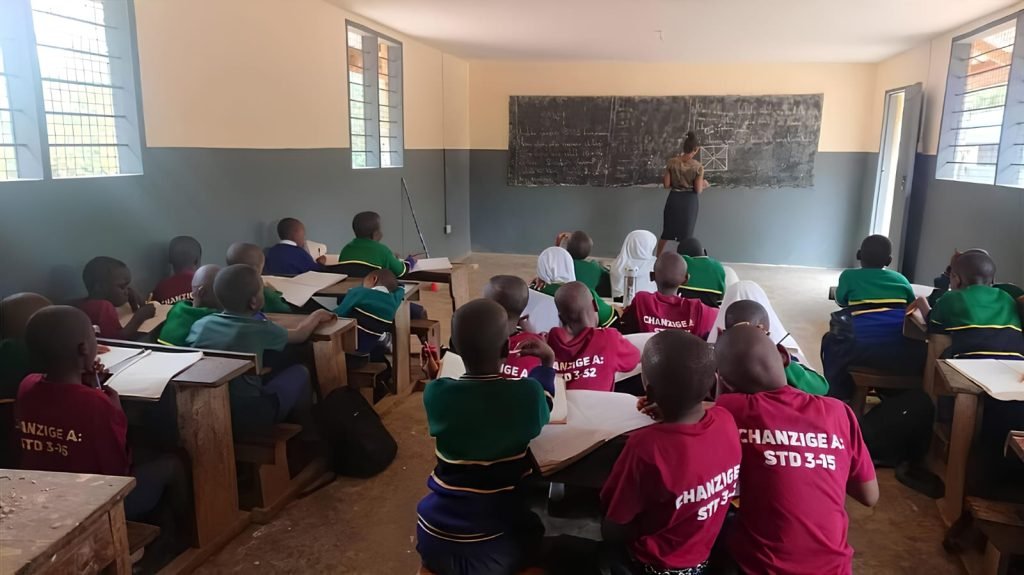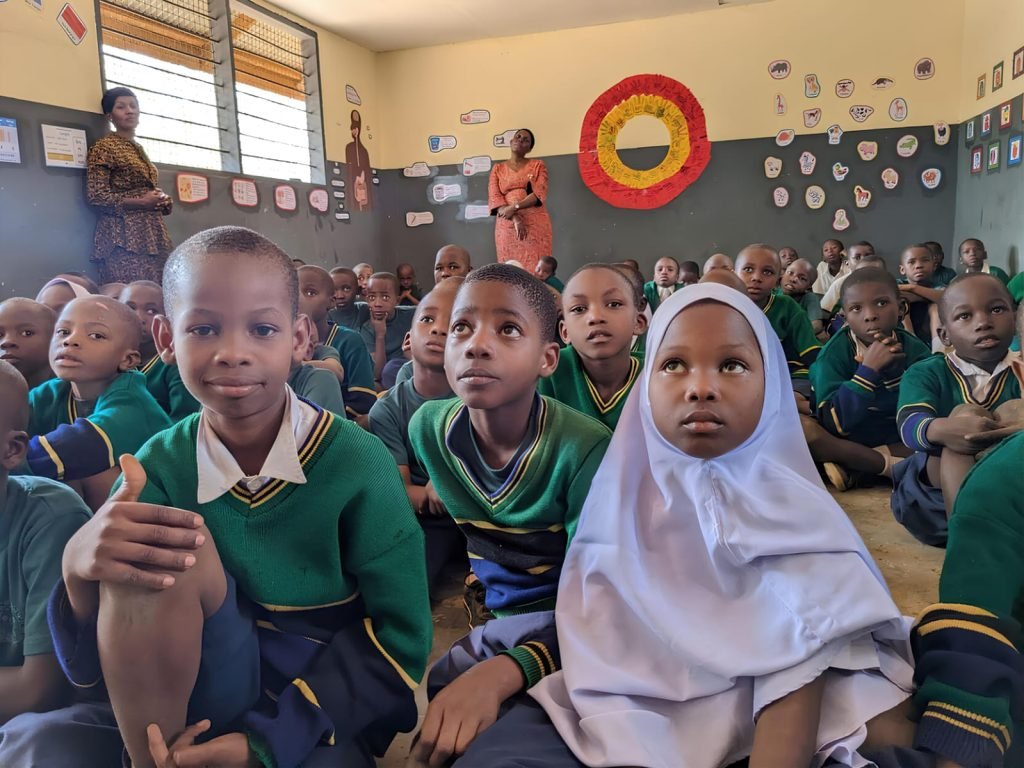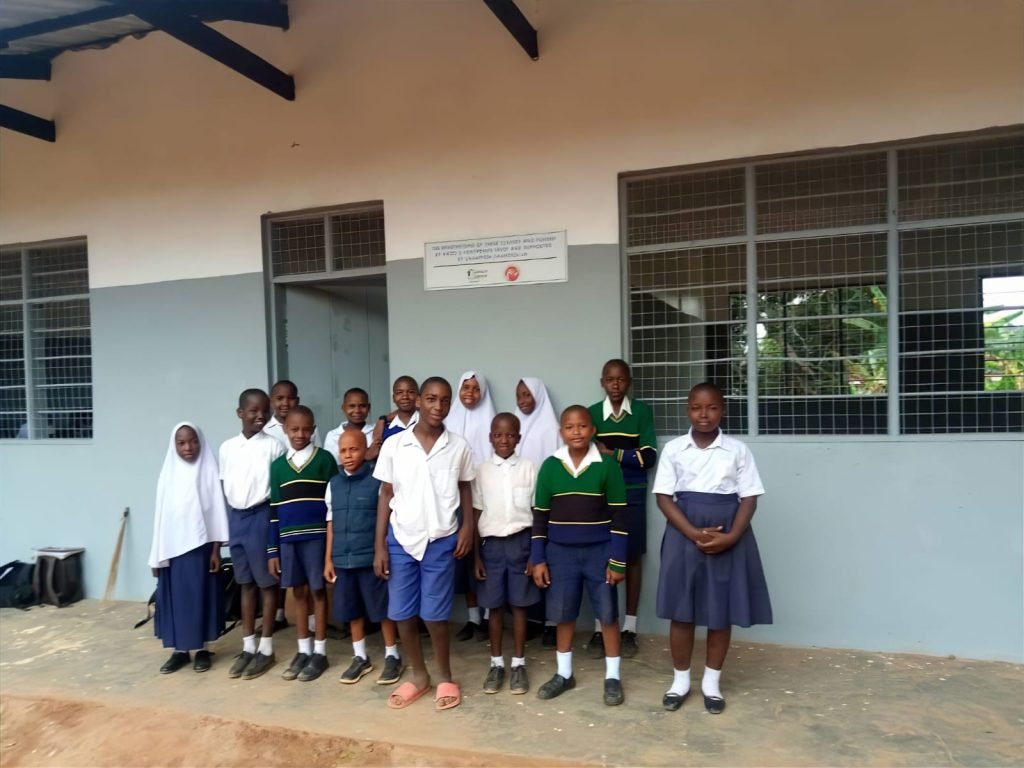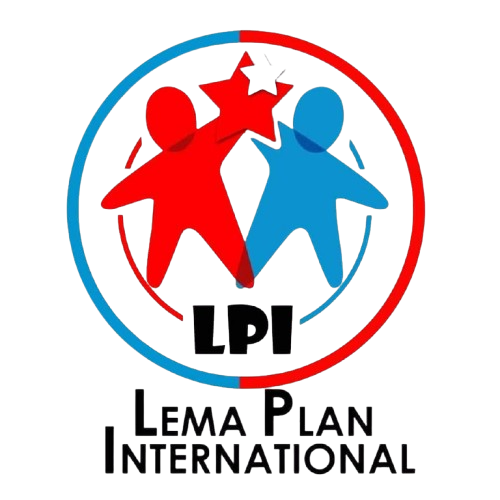Providing learning materials to underprivileged children in Tanzania forms a crucial part of a broader strategy to enhance educational accessibility. These fundamental resources are distributed towards empowering young learners and assisting them in their academic pursuits.
This program caters to the immediate requirement for school supplies and plays a significant role in advancing the overarching objective of fostering literacy and educational progress in marginalized societies. By working together with the Geneva-based Société Privée de Gérance (SPG S.A.) and the three primary schools in the Kisarawe council near Dar es Salaam, Tanzania, we will be able to improve many children’s educational opportunities.

The partnership with these institutions has enabled us to extend our reach and effectively contribute to the educational development of the youth in the region. Scheduled for implementation on July 10, 2023, this initiative holds a promise to transform the lives of disadvantaged children by providing them with the necessary tools to excel in their academic endeavors.
SPG S.A Geneva has a strong commitment to supporting humanitarian efforts on an annual basis, and this year, they have pledged financial assistance amounting to CHF 4,000 to aid underprivileged children in Tanzania through the Lema Plan International Association.
Despite the progress made in increasing school enrollment rates, especially among girls, in Tanzania, there are still significant challenges as highlighted by UNICEF. Approximately 3.2 million children between the ages of 7 and 17 are currently out of school, with 1.2 million having never experienced formal education, and the secondary school enrollment rate remains low at 27%.

The five schools that we have chosen to assist are located in the Kisarawe District Council, which is one of the seven councils in the Pwani region that were founded on July 1, 1907.
Kisarawe is located approximately 25 km northeast of Dar es Salaam, and derives its name from the Zaramo word “Tuharawe”, meaning “let’s go”, due to the historical presence of lions in the area. The Kisarawe Municipal Council is in charge of 19 of the district’s 17 districts, 66 villages, and 235 communities, with the district divided into 4 divisions.
1. Kibasila Primary School: Situated in Kisarawe District Council, Established in 2000 by Mr. Robert Nyampiga, Kibasila School in Kisarawe, Tanzania, is currently managed by Mr. Antonia Joseph Komba. The school has 472 pupils, with 234 boys and 238 girls. We recently provided exercise books and pens to 232 underprivileged children. The school requires additional support, as indicated by a recent request for ninety-seven tables and chairs, along with two computers, a printer, and a photocopier. Additionally, the financial burden of purchasing school essentials like uniforms poses a significant obstacle for these students, further hindering their educational progress.
In the future, the school hopes to acquire desks, tables, and office chairs to enhance the learning environment, eagerly anticipating their arrival.
2. Visegese Primary School: Founded in 2001 by Mr. Ramadhani Mtosa in Kazimzumbwi, Kisarawe, Tanzania, Visegese Elementary School is currently led by Mr. Ally Seif Nongwa. The school has 186 pupils, with eighty-six boys and one hundred girls. On July 15, 2024, 26 disadvantaged children received support from us. The school still needs four desks for teachers, fifteen desks for pupils, school uniforms, and computers.
3. Gumba Primary School: Established in 1977 by Mr. Abdallah Mbogo in Masaki, Kisarawe, Tanzania, Gumba Primary. The school is now headed by Mrs. Mwajuma Saidi Litanda. The school has 265 pupils, with 143 boys and 122 girls. Only sixteen disadvantaged children benefited from the exercise books and pens we distributed last week. The school still requires exercise books, pens, and school bags.
4. Chang’ombe B Primary.School: Is situated in Kibuta, Kisarawe, Tanzania, and was established by Mr. Henry William Mfune on January 1, 2010. The current principal is Mrs. Hadija Hassan Mponda, overseeing a total of 255 pupils, with 130 boys and 125 girls. Unfortunately, only twenty-five pupils were able to receive exercise books and sets of pens last week, highlighting the urgent need for more supplies to ensure that every student can benefit from this initiative.

5. Chale Primary School: Located in Boga, Kisarawe, in the coastal region of Tanzania, was founded by Mr. Mohamed Iddi Chazigula on January 14, 1978. The school is currently under the leadership of Mr. Joshua Enzi and has a total of 222 pupils, with 118 boys and 118 girls. Despite the efforts, only nineteen of the most disadvantaged children have been supported by the school’s initiative, indicating a pressing need for school supplies such as pens and notebooks for the remaining students. The school is also facing challenges due to the prevalent poverty rate in the area, with almost 50% of Kisarawe population living on less than $1.90 a day. As a result, there is a shortage of food and school supplies, and the school requires additional classrooms and teacher equipment to adequately support these children.
To successfully complete a semester, each student requires one box of pens containing 50 pieces, along with two exercise books for every subject they are enrolled in. This ensures that they have the necessary tools to excel academically and make the most out of their educational experience.
We invite you to be a part of our initiative, whether as an individual or a corporate entity, to make a difference in the lives of these children who are struggling with poverty. Your generous donations will go a long way in providing them with the resources they need to succeed in school and break the cycle of poverty. Kindly click on the link below to contribute and support this noble cause.
In conclusion, Tanzania has shown considerable advancement in the pursuit of universal basic education, with a notable increase in enrollment rates observed over the last decade. Despite this progress, student academic performance still falls short, mainly attributed to overcrowded classrooms and widespread poverty. Efforts made by the government and collaborating organizations to tackle ongoing obstacles such as inadequate school facilities, scarcity of teachers, and the need to enhance teacher quality through comprehensive and enduring strategies.
